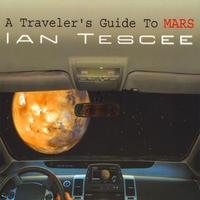Take classic era Tangerine Dream and Vangelis and add a distinct creative prog influence and you get a very interesting and enjoyable space album entitled- A Travelers Guide to Mars, inspired by space scientist William K. Hartmann's book. Though some people notice a Jean-Michel Jarre influence to creator- Ian Tescee's work, I hear quite little. Tescee's pieces contain more textures and layers of sophistication, than the over-bombastic trappings of Jarre.
This is intelligent, thinking music for the mind; it also can induce visuals and images that perfectly reflect the album's title. Though most of the recording was created on the various synthesizers than Ian uses, he does add analog guitar, and Nancy Snustad provides a cello solo on a song.
What I like about the album is that though intelligent, the album doesn't demand too much by the viewer, and this showcases the brilliance of Tescee's compositions and musicianship. Like a good Rembrandt painting, the detail is shown by a few strokes of the brush. Dynamics are kept under control and utilized smartly.
Though there isn't a lot of diversity into other genres within the compositions, the subtle variety within the theme and genre is quite interesting and never gets repeatative. A few pieces have a Tangerine Dream feel (such as the track- Life on Mars), while others have a Vangelis- Cosmos sound, and then you have more dramatic aggressive pieces such as- God of War.
I enjoyed painting and doing digital work while listening to A Traveler's guide to Mars in the background. On more than one occasion, my foot started tapping (unheard of with most prog fans LOL). Also it seems that the music helps the creative and analytical thought process, but maybe that's me.
Though I do bring up Vangelis and Tangerine Dream, Ian Tescee's music is original and stands firmly on its own merit. Space rock/music can be boring and/or overbearing or border on techno, but Tescee's works have a sophistication which obviously comes from years of experience. This music would be idea for science shows, planetariums, and movie work, as well as simply closing ones eyes and dream.
One of the tracks that hit a chord with me is the final composition- Billions and Billions of Stars (perhaps a reference to the late Carl Sagan?), which is the most acoustic piece on the album and is simply divinely beautiful. Mid-song, it rises to more powerful status without losing its aesthetic beauty. Piano work is simple and sublime. And the impact of the synth voices are wondrous. I didn't want the song to end.
On the whole, Ian Tescee's- A Travelers Guide to Mars, is marvelously crafted music without one low point or clinker on the disc. The compositions and execution are strong, poetic and not without it's toe-tapping use of clever percussion. If you are looking for excellent space-oriented music, than this album is a must buy. My one minor gripe is that I would love Ian to explore longer compositions. Some of his songs end way too soon. LOL
Album art is a photoshop-like photo composition which works adequately for space-rock.
This album is heartily recommended by Space music fans and Prog fans that tend to like JM Jarre, Vangelis, and Tangerine Dream, as well as artists and dreamers.
9.2 out of 10 rating


